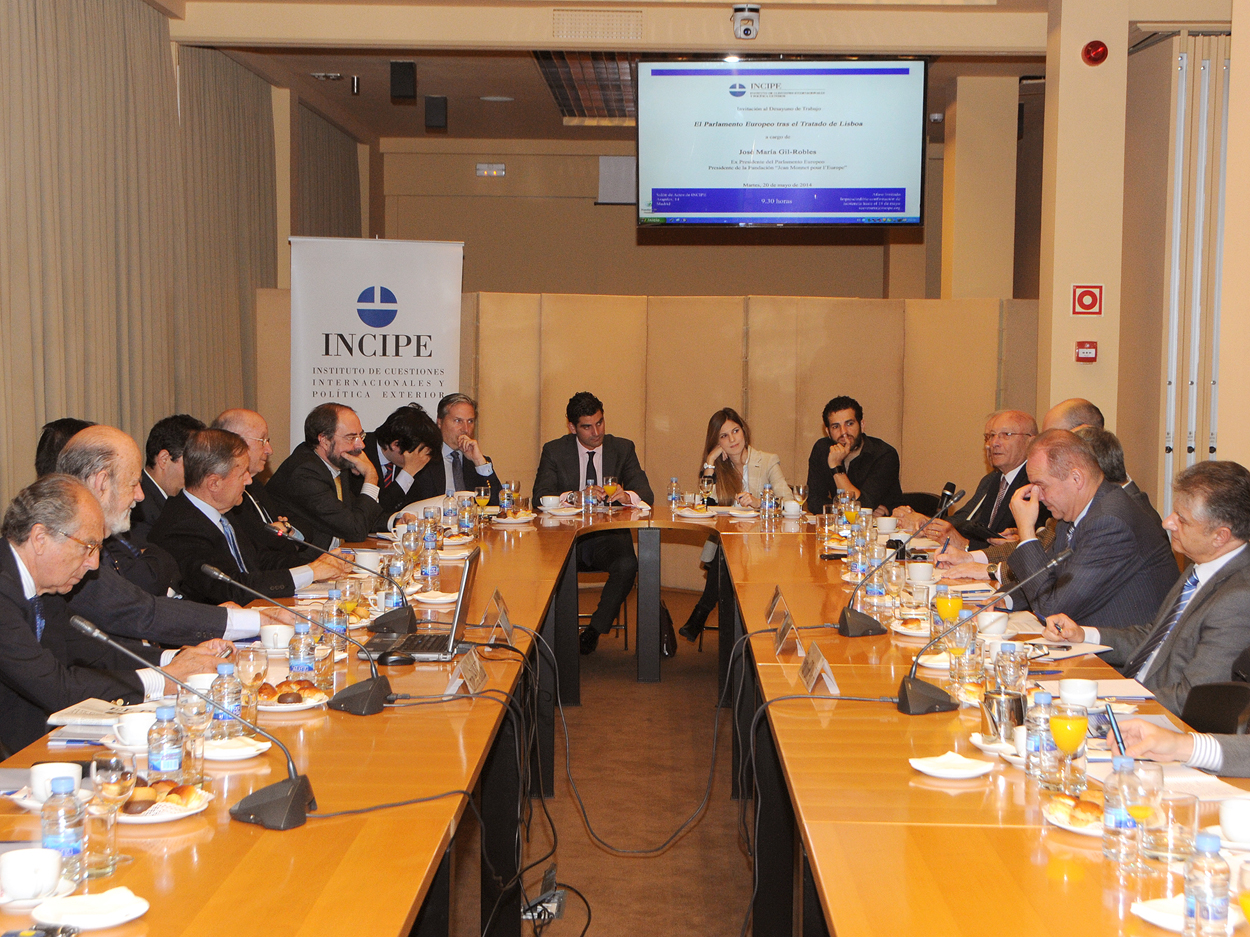The European Parliament after the Treaty of Lisbon

On May 20, 2014, INCIPE organized a Work Breakfast under the heading, The European Parliament after the Treaty of Lisbon, focusing on the situation of the European Parliament before the transcendental date at the polls on May 25th. D. José María Gil‐Robles, Former President of the European Parliament and current President of the “Jean Monnet pour l’ Éurope” Foundation, was the guest speaker who carried out this reflection.
José María Gil‐Robles began his dissertation noting that the European Union’s purpose is not only to build a political organization, but rather to endow it with purposeful content. He said, “It’s not only the suit, rather we should fit that suit on a body, a body that will constitute a solid social fabric.” Therefore, the European Parliament will be the institution responsible for forming and bringing cohesion to the community. In this framework, the decisions will pivot agreements and understandings between the different actors represented.
Gil‐Robles remembers a famous date when Monnet turned to De Gaulle during the Second World War, approximately seven years before the formation of the ECSC, and commented; “We must win the war but not lose the peace, and we must build ties between Germany and France through common industries. There should always be a negotiation. Adversaries are worth more than enemies.” Because of this, the Parliament should be a common ground of understanding and of continuous dialogue that helps with the achievement of a consensus.
He also pointed out that from the creation of this Institution more than 60 years ago, there has been a Great Alliance between Popular and Socialist, which has allowed for the consensus game to be carried out. Even so, the reality is that the European Parliament is not sovereign, but the Parliaments of the Member States, as a constituent power, are unmatched. Nonetheless, the attributions of the European Parliament have increased and grown in importance. On one hand, thanks to the co‐decision procedure (Council‐PE), more than 85% of the legislative measures are approved. On the other hand, the European Parliament is responsible for shaping the Commission, with the President included, following a proposal from the different groups represented. Furthermore, thanks to the new system of selffinancing of European political parties, party discipline is strengthened. Therefore, the Council should focus more on the important political lines, while the Commission in the day‐to day presents initiatives.
Another theme that was mentioned was the financing of the European Union, which should be one of the most important themes to be resolved in the upcoming legislation. In Gil‐Robles’s opinion, we demand to contribute an increasingly smaller amount to the European Union, which is unsustainable. Only the 1% of the European GDP is the budget for the European Union. 75% of this budget depends on the Member States, only 25% comes from their own taxes; customs, part of the VAT, withholding European Officials… In 2016, there is a promise to revise the conditions.
Another issue that was discussed was the degree to which politics affects, or will affect, the possible disaffection and abstention in the next European Parliament elections. Three points were indicated. One was the production of an effect of remoteness between representatives, although he gave the example of the United States, where some very high rates of abstention appear and it does not present us precisely with the problem of democratic deficit. Another point is the absence of efficient mechanisms and good structures for mediation (Lobbies, NGOs, Unions)…, which provides a sensation of misinformation for the citizens. The third point, which is actually a consequence of the first two points, is the ignorance that the average citizen suffers from. It is necessary to strengthen deepen the educational role, in addition to by politicians, must be assumed by the media.
Currently in the European Parliament, there are 500 million citizens represented by 766 delegates. Furthermore, there are 4000 European officials, 2400 of which are translators or interpreters distributed between the two headquarters. This shows how we continue and will continue to have problems with language. The motive for having two headquarters is simple. In the beginning, it was proposed that the headquarters would be in Strasbourg, which was an intermediate city between France and Germany after the war, and a symbolic gesture. As of today, the hypothetical elimination of this site in Strasbourg is almost impossible because France has the right to veto, and logically, they would not be in agreement with this change in situation.
Throughout the Work Breakfast, other issues that came about regarded the situation in Cataluña and the position of the European Union. We had abandoned the concept of sovereignty in Westphalia, the equilibrium between the Nation‐States, as Bodino indicated. Currently, we find a distribution of power between regions, and a disappearance of the monolithic sovereignty.
They are the States that decide how to divide their sovereignty, and which designate the competence of the competition. But Cataluña does not have this designated right because it is not a State. One cannot decide what is not conferred by law, and instead must prevail through legal rigor. Furthermore, the Treaty of Lisbon makes reference to the “fair legal ordinance of territories of each member state” and “the possibility of asking for help from other Member States if the previous rule is violated.”
At the end of the event, there were many questions and issues that elongated the length of the debate like: the possibility of creating a European Army, the role of lobbyists, the rise of Europhobic parties, and the situation of Spain within the EU.
Juan J. Roldán Martínez
INCIPE

